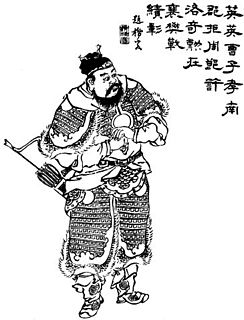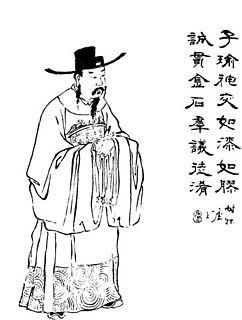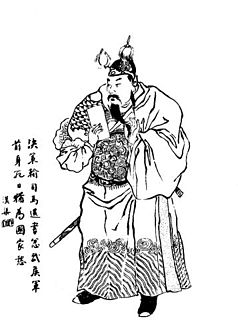Related Research Articles

Guan Yu, courtesy name Yunchang, was a Chinese military general serving under the warlord Liu Bei during the late Eastern Han dynasty of China. Along with Zhang Fei, he shared a brotherly relationship with Liu Bei and accompanied him on most of his early exploits. Guan Yu played a significant role in the events leading up to the end of the Han dynasty and the establishment of Liu Bei's state of Shu Han during the Three Kingdoms period. While he is remembered for his loyalty towards Liu Bei, he is also known for repaying Cao Cao's kindness by slaying Yan Liang, a general under Cao Cao's rival Yuan Shao, at the Battle of Boma. After Liu Bei gained control of Yi Province in 214, Guan Yu remained in Jing Province to govern and defend the area for about seven years. In 219, while he was away fighting Cao Cao's forces at the Battle of Fancheng, Liu Bei's ally Sun Quan broke the Sun–Liu alliance and sent his general Lü Meng to conquer Liu Bei's territories in Jing Province. By the time Guan Yu found out about the loss of Jing Province after his defeat at Fancheng, it was too late. He was subsequently captured in an ambush by Sun Quan's forces and executed.

The Battle of Xiaoting(猇亭之戰), also known as the Battle of Yiling and the Battle of Yiling and Xiaoting, was fought between the state of Shu and the state of Wu, between the years 221 and 222 in the early Three Kingdoms period of China. The battle is significant because Wu was able to turn the situation from a series of initial losses into a defensive stalemate, before proceeding to win a decisive victory over Shu. The Wu victory halted the Shu invasion and preceded the death of Liu Bei, Shu's founding emperor.

Zhou Yu (175–210), courtesy name Gongjin, was a Chinese military general and strategist serving under the warlord Sun Ce in the late Eastern Han dynasty of China. After Sun Ce died in the year 200, he continued serving under Sun Quan, Sun Ce's younger brother and successor. Zhou Yu is primarily known for his leading role in defeating the numerically superior forces of the northern warlord Cao Cao at the Battle of Red Cliffs in late 208, and again at the Battle of Jiangling in 209. Zhou Yu's victories served as the bedrock of Sun Quan's regime, which in 222 became Eastern Wu, one of the Three Kingdoms. Zhou Yu did not live to see Sun Quan's enthronement, however, as he died at the age of 35 in 210 while preparing to invade Yi Province. According to the Records of the Three Kingdoms, Zhou Yu was described as a tall and strong man with beautiful appearance. He was also referred to as "Master Zhou". However, his popular moniker "Zhou the Beautiful Youth" does not appear in either the Records or the 14th-century historical novel Romance of the Three Kingdoms. Some Japanese literary scholars such as Yoshikawa Eiji and Koide Fumihiko believe that this was a later invention by Japanese storytellers.

Xu Sheng, courtesy name Wenxiang, was a military general serving under the warlord Sun Quan in the late Eastern Han dynasty and early Three Kingdoms period of China.

Cao Ren, courtesy name Zixiao, was a military general serving during the late Eastern Han dynasty of China under the warlord Cao Cao, who was also his older second cousin. He continued serving in the state of Cao Wei – founded by Cao Cao's son and successor, Cao Pi – during the Three Kingdoms period. He played a significant part in assisting Cao Cao in the civil wars leading to the end of the Han dynasty. He was appointed as the Grand Marshal (大司馬) when Cao Pi ascended the throne, and was also credited by the latter for the establishment of Wei. However, Cao Ren was also once derided as a mediocre commander by Zhu Huan, a general from Wei's rival state Eastern Wu.

Zhuge Jin, courtesy name Ziyu, was a Chinese military general and politician of the state of Eastern Wu during the Three Kingdoms period of China. Born in the late Eastern Han dynasty, Zhuge Jin started his career in the 200s as an official under the warlord Sun Quan, who later became the founding emperor of Eastern Wu in the Three Kingdoms period. In 215, he served as Sun Quan's representative in a territorial dispute over southern Jing Province between Sun Quan and his ally, Liu Bei. In 219, he joined Sun Quan's general Lü Meng in an invasion of Liu Bei's territories in Jing Province after Sun Quan broke the Sun–Liu alliance. He was subsequently appointed as a general and commandery administrator. Before the Battle of Xiaoting of 221–222, Zhuge Jin attempted to dissuade Liu Bei from going to war with Sun Quan but was unsuccessful. The battle ultimately concluded with victory for Sun Quan's side; both sides made peace later and reestablished an alliance between the Eastern Wu and Shu Han states against their rival state, Cao Wei. From 222 until his death in 241, despite being rather incompetent in military affairs, Zhuge Jin served as one of Eastern Wu's top generals and participated in some battles against Cao Wei forces.

Cao Zhen, courtesy name Zidan, was a military general of the state of Cao Wei during the Three Kingdoms period of China. He was an adopted son of Cao Cao, a warlord who rose to power in the late Eastern Han dynasty and laid the foundation for Wei. After Cao Cao's death and the end of the Eastern Han dynasty, Cao Zhen served under Cao Pi and Cao Rui, the first two emperors of Wei. He is best known for leading a successful defence of Wei from the first two of a series of invasions by Wei's rival state, Shu Han, between 228 and 229.
Man Chong, courtesy name Boning, was a Chinese military general and politician of the state of Cao Wei during the Three Kingdoms period of China. He previously served under the warlord Cao Cao during the late Eastern Han dynasty. He is best known for defending the city of Hefei from a series of invasions by Wei's rival state, Eastern Wu, between 230 and 235.

Ding Feng, courtesy name Chengyuan, was a Chinese military general and politician of the state of Eastern Wu during the Three Kingdoms period of China.
Xiahou Shang, courtesy name Boren, was a Chinese military general and politician of the state of Cao Wei during the Three Kingdoms period of China. He was a distant younger relative of Xiahou Yuan and a close friend of Cao Pi, the first emperor of the Cao Wei state.
Huang Quan, courtesy name Gongheng, was a military general of the state of Wei during the Three Kingdoms period of China. He previously served under the warlords Liu Zhang and Liu Bei during the late Eastern Han dynasty and in the state of Shu during the early Three Kingdoms period before defecting to Wei. Liu Bei relied heavily on Huang Quan for counsel in both domestic and foreign policy. Under the Wei government, however, Huang Quan was restricted to only internal affairs because even though the Wei emperor Cao Pi appreciated him for his talent, he doubted Huang Quan's allegiance and believed he was still secretly loyal to Liu Bei.
Sun Kuang, courtesy name Jizuo, was a younger brother of Sun Quan, a Chinese warlord who lived during the late Eastern Han dynasty and became the founding emperor of the state of Eastern Wu in the Three Kingdoms period.
Pan Zhang, courtesy name Wengui, was a military general serving under the warlord Sun Quan during the late Eastern Han dynasty of China. He continued serving in the state of Eastern Wu during the Three Kingdoms period until his death.
Bu Zhi, courtesy name Zishan, was an official and military general of the state of Eastern Wu during the Three Kingdoms period of China. Originally a scholar of humble background, he became a subordinate of the warlord Sun Quan in the late Eastern Han dynasty and gradually rose through the ranks. Between 210 and 220, he served as the governor of the remote and restive Jiao Province in southern China. During the Battle of Xiaoting/Yiling of 221–222, he quelled local uprisings in Sun Quan's territories in southern Jing Province and maintained peace in the area. After Sun Quan became emperor in 229, Bu Zhi oversaw the Wu armed forces guarding the Wu–Shu border at Xiling for about 20 years. During this time, he also gave advice to Sun Quan's first heir apparent, Sun Deng, and spoke up for officials affected by Lü Yi's abuses of power. In 246, he became the fourth Imperial Chancellor of Wu, but died in office in the following year.
The Battle of Dongxing, also known as the Battle of Dongguan, was fought from January to February 253 between the states of Cao Wei and Eastern Wu during the Three Kingdoms period of China. The battle concluded with a tactical victory for Wu.
The Battle of Dongkou was a naval battle fought between October 222 and January 223 between forces of the state of Cao Wei and the Kingdom of Wu during the Three Kingdoms period of China. The battle concluded in a Wu victory.
The Eastern Wu campaign against Cao Wei was a military offensive launched in 241 by the state of Eastern Wu against its rival state, Cao Wei, during the Three Kingdoms period of China. The campaign was initiated by Wu's founding emperor, Sun Quan, two years after the death of the second Wei emperor, Cao Rui. The campaign ended with an overall failure.
Zhuge Rong, courtesy name Shuchang, was a military general of the state of Eastern Wu during the Three Kingdoms period of China. He was the third son of Zhuge Jin, a military general who served under Wu's founding emperor Sun Quan, and a younger brother of Zhuge Ke, a military general who briefly served as regent for Sun Quan's successor, Sun Liang.
Shi Ji, also known as Zhu Ji, courtesy name Gongxu, was a Chinese military general of the state of Eastern Wu during the Three Kingdoms period of China. He was the son of Zhu Ran, a general who served under Wu's founding emperor Sun Quan.
Hu Zong (183–243), courtesy name Weize, was a government official, writer, poet and military general of the state of Eastern Wu in the Three Kingdoms period of China.
References
- ↑ Sima (1084), vols. 69-70.
- ↑ (時然城中兵多腫病,堪戰者裁五千人。) Sanguozhi vol. 56.
- 1 2 3 4 5 de Crespigny (2004), p. 13.
- ↑ (備軍敗退,吳禮敬轉廢,帝欲興眾伐之,曄以為「彼新得志,上下齊心,而阻帶江湖,必難倉卒。」帝不聽。) Sanguozhi vol. 14.
- ↑ (秋九月,魏乃命曹休、張遼、臧霸出洞口,曹仁出濡須,曹真、夏侯尚、張郃、徐晃圍南郡。權遣呂範等督五軍,以舟軍拒休等,諸葛瑾、潘璋、楊粲救南郡,朱桓以濡須督拒仁。時揚、越蠻夷多未平集,內難未弭,故權卑辭上書,求自改厲,"若罪在難除,必不見置,當奉還土地民人。) Sanguozhi vol. 47.
- ↑ de Crespigny (2004), p. 11.
- 1 2 (... 召郃與真並朝許宮,遣南與夏侯尚擊江陵。郃別督諸軍渡江,取洲上屯塢。) Sanguozhi vol. 17.
- ↑ (魏遣曹真、夏侯尚、張郃等攻江陵,魏文帝自住宛,為其勢援,連屯圍城。) Sanguozhi vol. 56.
- ↑ (諸葛瑾、楊粲並會兵赴救,未知所出,而魏兵日渡不絕。) Sanguozhi vol. 55.
- ↑ (璋曰:"魏勢始盛,江水又淺,未可與戰。") Sanguozhi vol. 55.
- ↑ (便將所領,到魏上流五十里,伐葦數百萬束,縛作大筏,欲順流放火,燒敗浮橋。) Sanguozhi vol. 55.
- 1 2 (與夏侯尚等征孫權,擊牛渚屯,破之。) Sanguozhi vol. 9.
- ↑ (上軍大將軍曹真征硃然於江陵,毗行軍師。) Sanguozhi vol. 25.
- ↑ (黃初三年,車駕幸宛,使尚率諸軍與曹真共圍江陵。) Sanguozhi vol. 9.
- 1 2 (贼两头并前,官兵一道引去,不时得泄,将军石建、高迁仅得自免。) Sanguozhi vol. 14.
- ↑ (秋九月,魏乃命曹休、張遼、臧霸出洞口,曹仁出濡須,曹真、夏侯尚、張郃、徐晃圍南郡。) Sanguozhi vol. 47.
- ↑ (帝自許昌南征,諸軍兵並進,權臨江拒守。十一月辛丑,行幸宛。) Sanguozhi vol. 2.
- ↑ (大駕幸宛,征南大將軍夏侯尚等攻江陵,未拔。...) Sanguozhi vol. 14.
- ↑ (五年,幸广陵泗口,命荆、扬州诸军并进。会群臣,问:“权当自来不?”咸曰:“陛下亲征,权恐怖,必举国而应。又不敢以大众委之臣下,必自将而来。”晔曰:“彼谓陛下欲以万乘之重牵己,而超越江湖者在於别将,必勒兵待事,未有进退也。”大驾停住积日,权果不至,帝乃旋师。) Sanguozhi vol. 14.
- ↑ (與夏侯尚圍江陵,使聘別屯沔口,止石梵,自當一隊,御賊有功,遷後將軍,封新野侯。) Sanguozhi vol. 18.
- 1 2 (權遣將軍孫盛督萬人備州上,立圍塢,為然外救。) Sanguozhi vol. 56.
- ↑ (江陵令姚泰領兵備城北門,見外兵盛,城中人少,穀食慾盡。因與敵交通,謀為內應。垂發,事覺,然治戮泰。) Sanguozhi vol. 56.
- ↑ ((蒋钦)子壹封宣城侯,领兵拒刘备有功,还赴南郡,与魏交战,临陈卒。) Sanguozhi vol. 55.
- 1 2 (權遣潘璋、楊粲等解而圍不解。) Sanguozhi vol. 56.
- 1 2 (魏將夏侯尚等圍南郡。分前部三萬人作浮橋,渡百里洲上。諸葛瑾、楊粲並會兵赴救,未知所出,而魏兵日渡不絕。) Sanguozhi vol. 55.
- ↑ (吳錄曰:曹真、夏侯尚等圍硃然於江陵,又分據中州,瑾以大兵為之救援。) Wu Lu annotation in Sanguozhi vol. 52.
- ↑ (權將諸葛瑾與尚軍對江,瑾渡入江中渚,而分水軍於江中。) Sanguozhi vol. 9.
- Chen, Shou (3rd century). Records of the Three Kingdoms (Sanguozhi).
- de Crespigny, Rafe (2004). "Chapter Seven: Claim to the Mandate 222-229". Generals of the South: The foundation and early history of the Three Kingdoms state of Wu (PDF) (internet ed.). Faculty of Asian Studies, Australian National University. Archived from the original (PDF) on 22 June 2018. Retrieved 11 May 2018.
- Pei, Songzhi (5th century). Annotations to Records of the Three Kingdoms (Sanguozhi zhu).
- Sima, Guang (1084). Zizhi Tongjian .